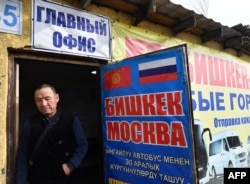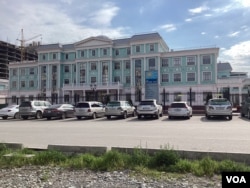Talas, a dusty town in northwestern Kyrgyzstan, is not accustomed to foreign dignitaries. Tourists occasionally stop there, but even officials from the Kyrgyz capital, Bishkek, rarely visit this remote part of the country.
In mid-April, though, a high-level Kremlin delegation descended on the town of 30,000, putting it in national spotlight.
On April 18 and 19, a Russian government delegation led by Igor Maslov, chief of the external cooperation directorate in President Vladimir Putin’s executive office, took part in ceremonies honoring local World War II veterans. The Kremlin officials gave a $2,000 award to Arake Arstanbekov, one of the few living veterans of that war from Talas, and donated textbooks and equipment to several local schools.
Addressing a group of Talas residents, Vladimir Korobovski, a representative of the Russian delegation, said the visit and assistance provided “clear symbols of friendly relations between Russia and Kyrgyzstan.”
“This act underscores the importance of humanitarian and social initiatives in supporting the development of [Kyrgyzstani] regions,” he said.
The delegation's visit, some regional experts say, is part of a broader Russian charm offensive to bolster Moscow’s influence in Central Asia. While Russia views Central Asia as vital to its national interests and its regional governments have cast themselves as Russia's partners because of historical, political and trade relations, some observers say Russian influence has been waning there because of Moscow's invasion of Ukraine.
Temur Umarov, a fellow at the Carnegie Russia Eurasia Center, said in a December 2022 analysis that the invasion significantly weakened Moscow’s influence among former Soviet republics, including those in Central Asia.
"None of the Central Asian nations have supported Russia’s invasion of Ukraine, and all are adhering to Western sanctions against Russia,” the report said.
“The region’s banks do not accept Russian MIR payment cards [used since Visa and Mastercard suspended Russian activity], for example, and only Kazakhstan allows their use by private individuals—and only after getting U.S. approval to do so. Not one of the countries in Central Asia has recognized the self-proclaimed Donetsk and Luhansk people’s republics — or other Ukrainian territory that Russia claims to have annexed — as part of Russia,” it said.
Russian officials showed their displeasure with this seeming disloyalty, with some MPs in Russia's Duma calling for stiffening restrictions on Central Asian migrants.
However, instead of relying on arm-twisting, Kremlin officials are evidently relying on soft-power diplomacy to win the hearts and minds of the regional countries. The campaign targets all of the five Central Asian republics, but the main focus is on Kyrgyzstan, long a key ally where Russian language and culture are particularly strong.
According to Russian Embassy in Bishkek, Kyrgyzstan’s capital, more than 350,000 people in the country are registered with the embassy as Russian “compatriots,” a category usually referring to those with Russian citizenship or who have family or professional ties to Russia.
Kyrgyzstan is also a member of two Russia-dominated organizations – the Collective Security Treaty Organization, a military alliance also including Armenia, Kazakhstan, Tajikistan and Belarus, and the Eurasian Economic Union, which also includes Armenia Balarus and Kazakhstan. In addition, Russia maintains a military airbase on the Kyrgyzstani territory, as part of CSTO cooperation.
Moscow unveiled plans in September to build nine Russian-language schools in Kyrgyzstan. At an estimated cost of $5.5 million, construction is to be completed by 2029. Russia also announced plans to build 10 schools in Uzbekistan and Tajikistan.
Moscow officials have adopted a variety of other measures to keep Kyrgyzstan within Russia's orbit of influence. A Russian-Kyrgyz Development Fund gave out more than $500 million for development projects in Kyrgyzstan between 2014 and 2023. The fund, established in 2014, is mainly financed by Russia.
Russia is also financing the Kyrgyz-Russian Slavonic University, a well-regarded higher educational institution in Kyrgyzstan. Each academic year, Russia gives out stipends to 1,000 Kyrgyzstani students for undergraduate arts and sciences study in Russia. As part of the annual academic exchange program, approximately 120 Russian secondary school teachers spend an academic year in Kyrgyzstan, where they teach Russian language and literature. An organization called the Coordination Council of Russian compatriots in Kyrgyzstan has united approximately 40 pro-Russian nonprofit organizations, and it serves as a conduit for Russian diplomacy.
Russian efforts working
Russia's diplomacy is paying off in Kyrgyzstan, according to analysts.
A Bishkek-based expert on Kyrgyz-Russia relations, speaking on condition of anonymity, told VOA Kyrgizstan “is one of the few countries in the region where Russian language and culture play dominant roles in society."
“Russian language has a status as an official language, and a lot of people rely on Russian media for their news," he said.
The expert said that because the Kremlin uses Russian media as a propaganda tool in Kyrgyzstan, many people have pro-Russian views of international affairs.
He cited the Kyrgyz foreign agents law, enacted last month, as among the most recent examples of Russian influence, saying it “was modeled after a Russian one, and it gives [Kyrgyz] authorities wide powers to control local NGOs."
He said the closure of Western organizations under the law will allow more Russian influence.
Some activists have voiced concerns that Kremlin is using rising influence to promote Russian state propaganda in Kyrgyzstan. Local media reports said Russia will not only build the nine schools in Kyrgyzstan, it will also provide all the technical resources and choose the school principals.
In a September 3 interview with RFE/Rl, Bishkek political analyst Aibek Tenizbaev asked what kind of educations programs the schools would follow.
“Kyrgyz authorities need to sort this issue out,” he said.
“Russia has adopted new standards. In their history textbooks, Russian authorities have included a section on their justification for the invasion of Ukraine in these textbooks, and these textbooks contain blunt [Russian government] propaganda," he said.
Politicians bothered
Russian efforts to expand its influence in Kyrgyzstan is bothering some politicians too.
Nurlanbek Shakiev, speaker of the Supreme Council, the country’s parliament, has emerged as a voice for political groups lamenting that Russian language and culture’s dominant role in Kyrgyzstan has been undercutting government efforts to spread use of Kyrgyz language.
Shakiev told Kyrgyz MPs on April 11 that, with children speaking Russian in villages across the country, “Kyrgyz [is disappearing because children are watching mainly Russian-language content on the internet.
“We need to block all broadcasts, all cartoons in Russian and other foreign languages," he said.
President Sadyr Japarov, apparently fearing to alienate Russia, quickly distanced himself from Shakiev's statement, calling it "Shakiev's personal opinion," adding that he disagreed with Shakiev's claim Kyrgyz is disappearing in villages.
"I haven’t heard our children speaking Russian since the childhood. On the contrary, there are cases when students leave school without knowing a word in Russian and go to Russia. They go there, and they have problems with the language. That is why I personally took the initiative and asked Vladimir Vladimirovich [Putin] to build nine Russian-language schools for us. Construction work will begin soon,” he said.
Japarov had previously played down activists’ concern about Russian-financed schools.
Addressing a September 1 groundbreaking ceremony for one of the schools, he said, “The language of instruction in these schools is Russian, and the curriculum will be based on the standards adopted in both of the two countries."








